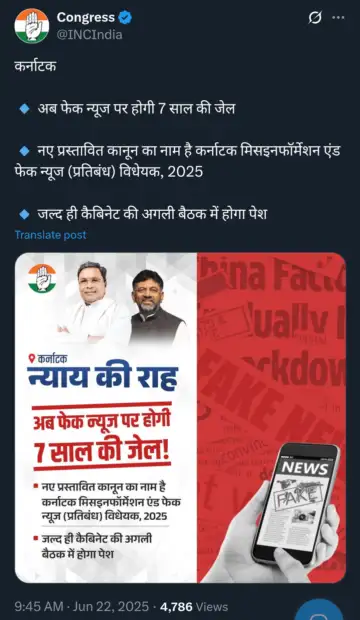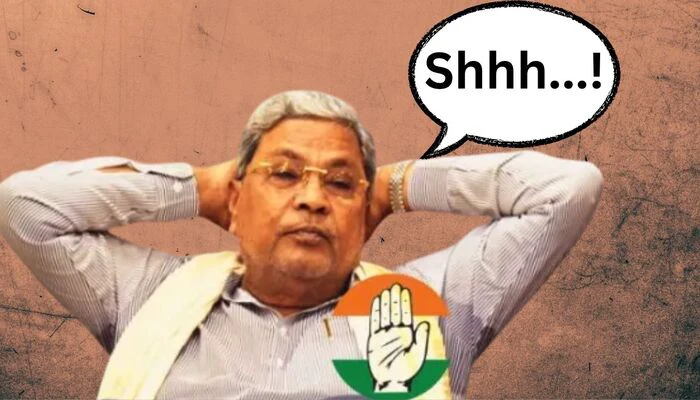Ahead of the 50th anniversary of 21-month long emergency imposed by Indira Gandhi-led Congress government, the Karnataka government is set to introduce a law to curb speech that it considers as ‘fake news’ of ‘misinformation’.
With the bill titled Karnataka Misinformation and Fake News (Prohibition) Bill, 2025, the Siddaramaiah government aims to put the behind the bars anyone found spreading what the state government categories as false or inaccurate information on social media.
As per reports, the bill will empower the state government to start criminal proceedings against any person, found to be sharing what the government considers as false information.
 Screenshot of X post of Congress (via X)
Screenshot of X post of Congress (via X)
The grounds for taking criminal action as provided in the proposed bill are, threat to public health, safety, peace, or the integrity of elections.
A person found guilty under the proposed law could be granted up to 7 years’ imprisonment or fine of up to ₹10 lakh, or both.
The bill proposes a minimum sentence of 2 years, extendable up to 5 years coupled with fine. Aiding or abetting the distribution of content censored under the bill can attract up to 2 years of imprisonment.
Six member authority to block, ban any ‘false content’
Under the draft bill, a six-member social media regulatory authority called the Fake News on Social Media Regulatory Authority, will be constituted to restrict, block, and ban any content that it would consider to be false or misleading.
The authority will be given all the necessary powers to ensure that “fake news” or any “harmful content” is not promoted and distributed online.
Members of this authority will include the Minister for Kannada and Culture, to serve as the ex-officio Chairperson, one member each from the Legislative Assembly and Legislative Council, two members representing social media companies, appointed by the state and a senior IAS officer designated as the Secretary of the Authority.
Special Courts to be set up under the proposed bill
The bill confers sweeping powers on the state government to take action against not just people residing in Karnataka but also those living outside the state.
Special Court presided by a Sessions Judge will be set up under the bill to try people charged under the provisions of the bill.
The special courts can issue directions to intermediaries, publishers, broadcasters, or any other person exercising control over a communication medium distributing ‘misinformation’ to persons in Karnataka.
Congress, history of curbing free speech and the Emergency
Censoring freedom of speech forms a part of Congress party’s political legacy.
The imposed by late Prime Minister Indira Gandhi, resulted in lakhs of citizens and political leaders being ailed, banning of the RSS, and imposition of pre-censorship on newspapers.
This dark chapter that narrates the worst assault on Indian democracy was written by the Congress party that often accuses Modi government of being .
The proposed bill invokes the fear that it may become a tool in the hands of the Karnataka state government to be used selectively to curb speech that it does not like. On several occasions, the top leadership of the Congress Party have been found upholding or undermining freedom of speech at their own whim and fancy.
In 2018, Congress demanded a banning of the movie ‘The Accidental Prime Minister’, which based on Sanjaya Baru’s book and showed how the then Congress government was remotely controlled by Sonia Gandhi. Ironically, Congress leader Rahul Gandhi passionately promoted a movie called Udta Punja, a movie that highlighted the drug abuse problem in Punjab, and was released at a time when there was a coalition government of BJP and Shiromani Akali Dal in Punjab.
Another movie Mersel, which supposedly spread canards about demonetisation was also upheld as a beacon of freedom of speech by Rahul Gandhi. He asserted that Modi was interfering in the film. Congress party is notorious for going after journalists for showing reports that criticise Congress government.
In May 2022, Congress leader Pawan Khera filed a case against journalist Arnab Goswami after a news report was broadcast on Republic Bharat, a Hindi news channel that is part of the Republic Media Network, about the destruction of a temple in Rajgarh and a demolition drive in Alwar, Rajasthan.
The most recent example of Congress government targeting media for showing was seen in Congress-ruledTelangana where Chief Minister Anumula Revanth Reddy said that anyone using offensive language for him and his family would be stripped and paraded in public.
His statement came after Telangana police detained senior journalist Revathi Pogadadanda and her colleague Tanvi Yadav in connection with the interview of a farmer who allegedly used derogatory language to express his dissatisfaction with the government in Telangana.
